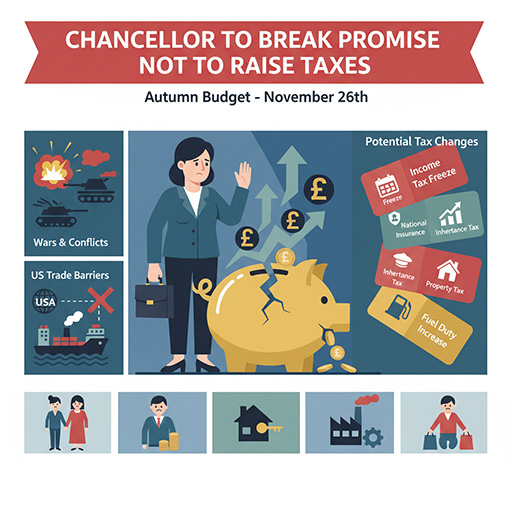Chancellor Rachel Reeves has made a significant admission; she no longer stands by her promise not to raise taxes. With just eight weeks until the crucial 2025 Autumn Budget on November 26th, this reversal has left many wondering what it means for their personal finances. Let's take a look at this complex situation and explore how Reeves' decision changes our Budget predictions.
Why is Rachel Reeve's breaking her no tax rise promise?
To understand her mindset we need to go back to November 2024. Speaking to business leaders at the Confederation of British Industry (CBI), Rachel Reeves made a clear commitment; she was "not coming back with more borrowing or more taxes". This pledge came after her first budget had already introduced £40 billion in tax increases, and it was meant to reassure businesses and taxpayers that the worst was over.
Fast-forward eleven months, and the economic landscape looks very different. The original optimism has given way to harsh financial realities, and the Chancellor finds herself in the uncomfortable position of having to eat her words. This isn’t necessarily about political dishonesty (sometimes economic circumstances genuinely change faster than politicians can keep up with their promises).
The reversal represents a classic case of what economists call a "policy trilemma"; the impossible task of simultaneously meeting spending commitments, keeping manifesto promises, and maintaining borrowing within acceptable limits. Something had to give, and unfortunately for taxpayers, it appears to be the tax pledge.
Did Rachel Reeve's explicitly say she will 'raise taxes'?
When pressed about her November 2024 commitment, Reeves was remarkably direct: "the world has changed", she said. She pointed to three major global factors that have shifted the economic ground beneath the government’s feet:
Wars and Conflicts
The ongoing conflicts in Europe and the Middle East have created economic un‐certainty and increased costs for the UK, both directly through higher energy prices and indirectly through disrupted supply chains and increased defense spending.
US Trade Barriers
The implementation of new US tariffs has created additional trade barriers that affect UK exports and economic growth prospects, reducing the tax revenue the government can expect from economic activity.
Higher Borrowing Costs
Global interest rates have remained higher than expected, making it more expensive for the government to borrow money. This means that funding public services through debt has become significantly more costly.
Now, importantly, Reeves did hint at some boundaries for potential tax rises. She strongly suggested that VAT would not increase, stating that doing that would "hit working people directly and stoke inflation". She also emphasized that Labour's manifesto commitments "do stand", which technically protects income tax rates, National Insurance for employees, and corporation tax from increases. However, there are many ways to raise taxes without breaking these specific pledges.
With a £41 billion hole to fill, where will she aim to raise the revenue from?
What are the potential tax changes coming in the Autumn Budget?
While the government can't break its manifesto promises on major tax rates, there are numerous ways to raise additional revenue. Here are the most likely options being considered:
Income Tax Changes (Without Rate Increases)
The government could extend the current freeze on tax-free allowances beyond 2028 to 2030, raising an estimated £7-8 billion annually through fiscal drag; essentially, as wages rise but tax thresholds don’t, more income gets taxed. They might also reduce the personal allowance or basic-rate threshold, potentially raising £6-10 billion annually.
National Insurance Expansion
While employee National Insurance rates are protected, employer rates could increase further. More significantly, the government could extend National Insurance to rental income from landlords (raising £2 billion annually) or apply it to pension contributions (potentially raising £17 billion).
Capital Gains Tax Reform
This could be a major revenue raiser, with comprehensive reforms potentially generating £8 billion annually. The government might align Capital Gains Tax rates with dividend tax rates (up to 39.35%) or end the current rule that forgives capital gains at death.
Inheritance Tax Changes
From April 2026, the government plans to cap agricultural and business property relief at £1 million, and from April 2027, pension pots will be brought into new inheritance tax scope. These changes could raise £2.5 billion annually.
Property Tax Reforms
Council tax reforms making bills more proportional to current property values could raise billions, though this would be politically sensitive. A mansion tax on high-value properties is also being discussed.
Fuel Duty Increases
Simply ending the temporary 5p cut and allowing scheduled increases could raise £4.8 billion by 2028-29. This would be felt immediately by anyone who drives or relies on transported goods.
Who will be affected by Autumn Budget tax rises?
The impact of these potential changes wouldn’t be felt equally across society:
Middle-Income Earners
This group could be hit hardest by income tax threshold freezes and National Insurance expansion. A typical family earning £50,000 - £70,000 might see their tax bill increase by £1,000 - £2,000 annually if multiple measures are implemented.
High Earners and Wealth Holders
Those earning over £100,000 or holding significant assets would bear the brunt of Capital Gains Tax reforms, inheritance tax changes, and pension relief restrictions. For some, this could mean additional tax bills of thousands of pounds annually.
Property Owners and Landlords
Landlords could face National Insurance on rental income, while homeowners in high-value areas might see increased council tax or new property taxes. Buy-to-let landlords earning £60,000 from rentals could face an additional £1,057 annually.
Business Owners
Employer National Insurance increases would directly impact businesses, potentially affecting hiring decisions and wage growth. However, corporation tax rates would remain stable, providing some certainty.
Lower-Income Households
This group would be largely protected from direct tax rises, though they could be affected by fuel duty increases and any inflationary effects from higher business costs being passed on to consumers.
The November 26 Autumn Budget will reveal exactly which of these potential measures become reality.


